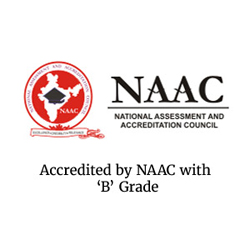Guidelines for the Socioeconomically Disadvantaged Group Cell
- Objectives
The Socioeconomically Disadvantaged Group (SEDG) Cell aims to:
- Support students from economically and socially disadvantaged backgrounds.
- Ensure equitable access to education, resources, and opportunities.
- Create an inclusive and supportive environment to foster their academic and personal growth.
- Provide financial assistance, counseling, and career guidance.
- Empower students to overcome challenges and achieve self-reliance.
- Structure of the SEDG Cell
- Chairperson: The Principal of the College.
- Coordinator: A senior faculty member committed to social equity.
- Members:
- Faculty representatives from various departments.
- Representatives from the student body.
- Social workers or experts in the field of socio-economic development.
- Responsibilities of the SEDG Cell
- Identification and Support:
- Identify students from socioeconomically disadvantaged groups through applications, surveys, and interactions.
- Provide scholarships, fee concessions, and financial aid to deserving students.
- Awareness and Sensitization:
- Organize programs to sensitize the campus community to the needs of disadvantaged groups.
- Promote a culture of inclusivity and respect.
- Academic Assistance:
- Offer remedial classes, mentoring, and academic support to students in need.
- Provide access to learning materials, including textbooks and digital resources.
- Skill Development and Employment:
- Conduct workshops and training programs to enhance employability skills.
- Facilitate internships and job placements through collaboration with industries and NGOs.
- Counseling and Guidance:
- Provide emotional and psychological support through counseling services.
- Guide students in applying for government schemes, scholarships, and benefits.
- Community Engagement:
- Encourage students to participate in community service and outreach programs.
- Foster a spirit of social responsibility and leadership among students.
- Guidelines for Students
- Students belonging to socioeconomically disadvantaged groups must register with the Cell to avail of its benefits.
- Applicants must provide necessary documentation for financial aid or scholarships.
- Students are encouraged to actively participate in the activities and programs organized by the Cell.
- Code of Conduct
- All interactions and activities must uphold dignity, respect, and confidentiality.
- Benefits provided by the Cell should not be misused or misrepresented.
- Members of the Cell must maintain a professional and empathetic approach while dealing with students.
- 6. Collaboration and Networking
- Collaborate with government agencies, NGOs, and funding organizations to expand resources and opportunities.
- Develop partnerships with alumni and philanthropists for scholarships and mentorship programs.
- 7. Monitoring and Reporting
- The SEDG Cell will maintain records of its activities, beneficiaries, and outcomes.
- Regular feedback from students and stakeholders will guide improvements in the Cell’s functioning.
- An annual report will be submitted to the Principal detailing the Cell’s initiatives and impact.
- Outcomes
- Enhanced access to education and resources for socioeconomically disadvantaged students.
- Improved academic performance, self-confidence, and career readiness.
- Promotion of an inclusive and equitable campus environment.
By implementing these guidelines, the Socioeconomically Disadvantaged Group Cell at Gonzaga College of Arts and Science for Women seeks to empower students to overcome barriers and achieve their full potential.

